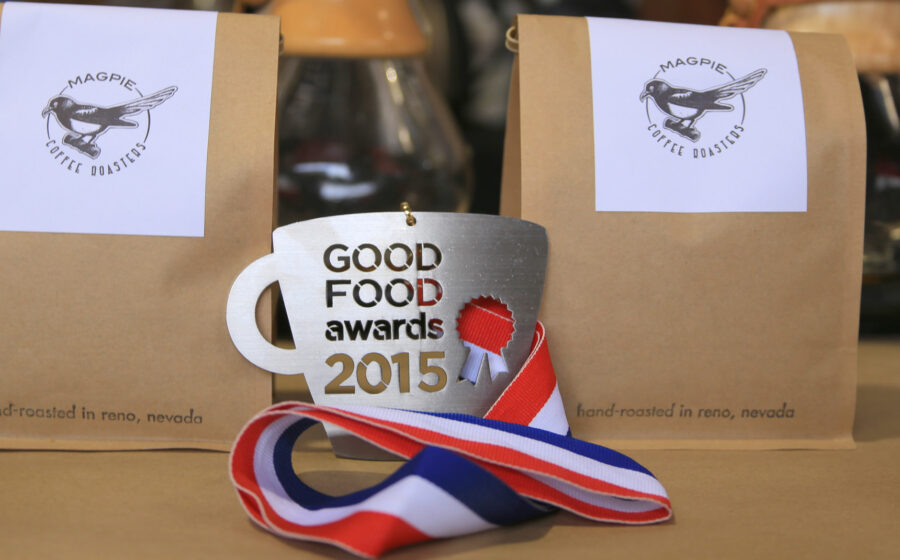[I]n a recent, under-publicized move, the Good Food Awards has allied with the Roasters Guild to change judging standards for the coffee segment of the competition. The annual competition for sustainable, American-made food products presents over a hundred prizes in thirteen different categories; everything from pickles to honey, cider, and cheese. Winners earn the Good Food Awards seal, and a place in a coveted marketplace event held in San Francisco the following January.
The recent coffee-judging changes will switch brewing to home-brewing equipment rather than cupping, enforce certifications and documentation of lots, and evaluate coffees with the new Brewers Cup form, rather than the Cup of Excellence score sheet.
Nathanael May, director of coffee at Portland Roasting and a regular Fresh Cup contributor, and also a GFA judge this year, says that because the Cup of Excellence judging form was used in the past, the competition favored bright, acidity-forward coffees.
While the program promises to be much more interesting this year, the changes were announced after the submission period had begun.
“On top of that,” he says, “the listed requirements for traceability, farmgate pricing, and reductions in agrochemical use were rarely enforced. This led to everyone entering Kenyas and Ethiopias that traditionally score really well with coffee professionals and that, coupled with the lax enforcement of requirements, led to the same kinds of coffees winning. Of course, for companies that try to meet the requirements, and ended up not scoring as well because of that, it was frustrating. Why try if the requirements aren’t truly enforced?”
Though a prestigious competition, the Good Food Awards has for years puzzled and frustrated coffee roasters of all kinds. While the program promises to be much more interesting this year, the changes were announced after the submission period had begun. (My company Catalyst Coffee Consulting was among the roasters who had formulated a roast for the competition based on the old standards.)
Why the lack of lead-up communication with the coffee industry on the judging changes, and why the new alliance with the Roasters Guild? Sarah Weiner, who founded the Good Food Awards in 2009 with Dominic Phillips, says it was all about the realities of the new collaboration: getting ideas vetted and logistics secured took too long to alert the coffee community before July sixth (when the entry period began) and the new team didn’t want to wait until the following year. Weiner says, “We made the changes to the entry form messaging mid-month, before seventy-five percent of the entries had come in, and regarding the twenty-five percent that had already entered, we e-mailed them with the changes and gave them a month from the message to choose a new coffee should they like.”
By using the new judging protocols we hope to see a wider range of coffees entered as the new form does not favor one type of attribute over another.
Mark Inman of Olam Specialty Coffee, the immediate past chair of the Guild, says, “Since the inception of the GFA, the Roasters Guild had a desire to be involved. As the GFA evolved and started working with other guilds (such as cheese, butcher’s, and bread), both the GFA and the RG saw their involvement as the natural next step in the evolution of the coffee category.”
Instead of blind-cupping the coffees, judges will brew the coffees using home-brewing equipment donated by Espresso Supply, Bonavita, and Baratza: BV1900TS brewers and Baratza Forte BG grinders. The recipe will be seventy-two grams of coffee to 1.3 liters water. The idea, says Inman, is simple: “By using the new judging protocols we hope to see a wider range of coffees entered as the new form does not favor one type of attribute over another, as it had on the previous judging protocols. A medium roast coffee or a blend could just as easily score as high as a very high acid Kenya or Ethiopia now that the scoring is weighing multiple attributes equally.”
Weiner shares that, in the past, it has been complicated to verify the sustainability of each coffee submitted for judging, and by strongly recommending that each coffee submitted carries one of seven certifications (National Organic Program, Fair Trade USA or Fairtrade International, Bird Friendly, Rainforest Alliance, C.A.F.E. Practices, 4C Association, and Demeter Biodynamic) or requiring extensive documentation of farming and sourcing practices during the qualification process, the judging team hopes to ensure the quality of coffees submitted.
This year, the Good Food Coffee Awards will be different, and everyone hopes, better. May says, “As a judge, this is great news (more variety in coffees!), and as an entrant, this is even better (more realistic chance of doing well with a larger variety of origins!).”
—Emily McIntyre is a regular contributor to Fresh Cup.
















